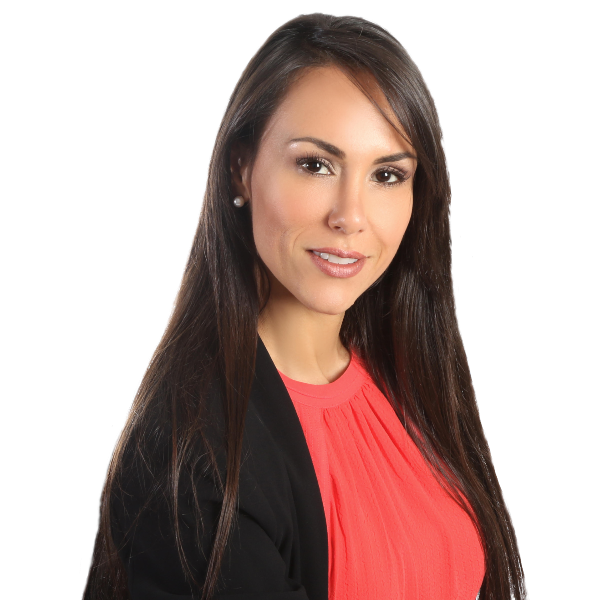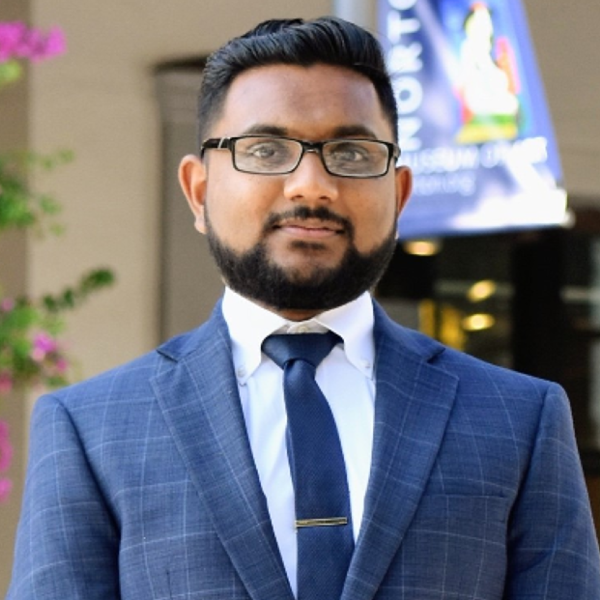
Alexandra Bazo and Ishmam Ahmed are both super busy and live in West Palm Beach, Fla. Outside of that, they don’t seem to have a lot in common.
Her family is from Venezuela; his is from Bangladesh. She’s a working mother of three; he’s 26 and just starting out.
But they share a passion for the real estate industry—particularly international real estate. And, because of that interest and dedication, the two students from the Master’s in Real Estate (MPRE) program at Georgetown University were selected as graduate student Fellows for a prestigious mentoring program sponsored by the nonprofit AFIRE [Association for International Real Estate Investors].
Over the course of a year, each Fellow is mentored by a mid-level professional called a Rising Star, who, in turn, is counseled by a Senior Leader Mentor. These three-person groups meet regularly to discuss career challenges, share insights, and help fulfill AFIRE’s mission “to help each other become better investors, better leaders, and better global citizens.”
A Need for Diversity
AFIRE hopes the program will help diversify the real estate investment industry. It has set a goal of having 67 percent of the Rising Leaders and Fellows be either women or persons of color. According to the National Association of REALTORS, 65 percent of REALTORs are women, but they make up only 36.7 percent of the workforce in commercial real estate and are underrepresented in executive positions that tend to be dominated by white men.
There are many benefits to diversifying a business. Not only is it the right thing to do; numerous studies show that diverse companies are more innovative—and profitable. And it is especially important for a sector like real estate.
“Real Estate development is always introducing change,” says Glenn Williamson, faculty director of Georgetown’s MPRE program. “The useful commercial life of a building is about 30 years, so whatever steps you take to build something, you want to make sure it’s serving the community for the next 30 years. And the more voices you can listen to when you’re planning that, the better the connection you’re going to make with all the new products that you deliver.”
A New Understanding

Bazo comes from a family of real estate investors who have developed property in Florida, Venezuela, and the Caribbean. She started her commercial real estate career as a broker for NAI/Merin Hunter Codman in West Palm Beach. After earning her master’s degree in May 2022, she will become a development associate with Hedrick Brothers Construction.
“In my new position for Hedrick Brothers Construction, I will be underwriting and assessing financial feasibility for development projects,” Bazo says. “I will follow the projects through development and ultimately through their disposition, which will take my career and experience to new levels.”
Bazo learned a lot about the industry from her family. Still, she remembers feeling a little isolated and unsettled when she transitioned from residential sales to commercial real estate, where the vast majority of practitioners are men. Working with her mentors has helped her find her voice and learn even more about the field.
“Even though I have had experience, I wasn’t really having a wider array of experience and guidance,” Bazo says. “For example, I had no idea of the salary expectations for someone with my degree. Understanding your worth, and understanding from an executive how to approach certain topics, I think is extremely important.”
A Chance ‘To Learn as Much as I Can’

Ahmed, the other Fellow from Georgetown, has been an entrepreneur since he was a student at the University of Central Florida. When he graduated in April 2020, he had been operating a bubble tea company for several years, but the business succumbed to a sudden drop in customers during the earlier stages of the pandemic.
That didn’t deter him, however, and he decided to enroll in Georgetown’s program and get foundational and hands-on training in a field that he had always found exciting.
“I was just fascinated by the skyscrapers going up in New York City,” he says. “It intrigued me. I was, like, ‘Who’s putting those skyscrapers together? Why does a condo sell for $100 million? How does that make sense?’”
Ahmed hopes to find his niche in Islamic financing—first in insurance, and later in real estate. The practice is informed by rules outlined in his faith.
“As Muslims, we can’t earn or pay compounding interest, so our loans are structured differently,” Ahmed says. “In essence, our banking systems are more equity-based versus debt-based obligations.”
He was inspired by a professor who is opening an Islamic insurance agency in the United Kingdom. “Maybe I can try to do that in the U.S.” before moving later into real estate? he says.
For Ahmed, the program and mentorship are “a real learning opportunity,” a chance “to learn as much as I can from people who have done this for many years, to see where things are going, try to position myself as a future professional in this industry and try to find my mark, my little mark, in that world.”
